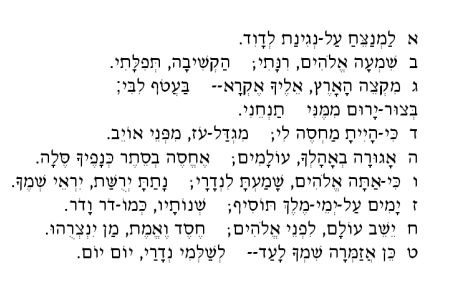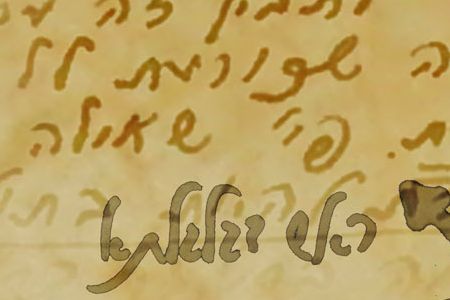Psalm 61
To the choirmaster: with stringed instruments. To David.
Hear my cry, O Creator,
listen to my prayer;
2 From the end of the earth I call to you
when my heart is faint.
Lead me to the rock
that is higher than I,
3 For you have been my refuge,
a strong tower against the enemy.
4 May I dwell in your tent forever!
May I take refuge under the shelter of your wings! Selah
5 For you, O Creator, have heard my vows;
you have given me the heritage of those who fear your name.
6 Prolong the life of the king;
may his years endure to all generations!
7 May he be enthroned forever before The Creator;
appoint steadfast love and faithfulness to watch over him!
8 So will I ever sing praises to your name,
as I perform my vows day after day.
We see that the person has gone through a lot in his path, until he discovers that the Creator conceals and reveals Himself, and secondly, protects the person with His wings and cover, and thirdly, protects him practically with His support.
It is hard for a person to connect two forms of guidance, where on one hand, everything comes from the Creator, and on the other hand, he needs to request that the Creator help, protect and cover him. Protect him from what? From the enemies that the Creator Himself arranges for the person?
The Creator organizes His guidance in two lines so that the person can stabilize himself in the middle line. As such, the person is quite confused, and doesn’t exactly know how to be together in all the states, until he acquires the two lines, stabilizes the middle line, and then he has understanding and mutual work with the Creator such that he understands that there is reciprocity, guidance and learning which brings the person to adhesion with the Creator.
Until then, however, in each and every generation, in each and every state, there are states which come and confuse the person a lot in terms of the extent to which he needs to correct the vessels (Kelim) to discover the unity of the Creator’s guidance – in terms of the apparent bad or evil that appears through the uncorrected vessels, and in terms of the good that shines in the corrected vessels – which give the person the ability to perceive through two lines, in which the person constructs himself. The person, the human being (Adam), is the middle line.
“Psalms Commentary – Psalm 61: To the Choirmaster” is based on the Daily Kabbalah Lesson of May 4, 2014, “Preparation.” You can watch and/or download this lesson in video and audio formats from the Kabbalah Media Archive.
What is the Creator? What does it mean that the Creator reveals and conceals Himself? Why is the Creator referred to as “Him,” in masculine form? What are the left, right and middle lines in a person’s spiritual work? What is “adhesion with the Creator”? What does it mean, that a person “corrects his vessels (Kelim)” and what are these “vessels” that the person corrects? What does it mean that the human being (Adam) is the middle line? All these questions and more are dealt with in the Free Kabbalah Course, which provides the fundamental principles and tools by which to correctly approach the wisdom of Kabbalah. It is recommended to take the Free Kabbalah Course before approaching the Daily Kabbalah Lessons with Dr. Michael Laitman. Click the banner below to sign up…



